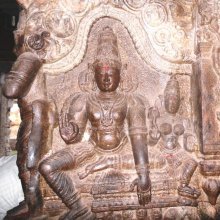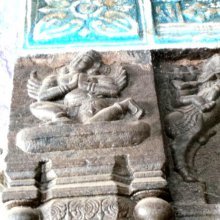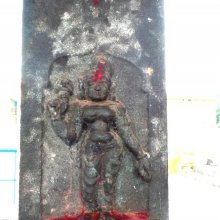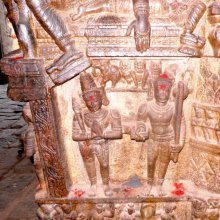Cira, Cīra, Cīrā, Ciṟa: 29 definitions
Introduction:
Cira means something in Buddhism, Pali, Hinduism, Sanskrit, Jainism, Prakrit, Marathi, Hindi, biology, Tamil. If you want to know the exact meaning, history, etymology or English translation of this term then check out the descriptions on this page. Add your comment or reference to a book if you want to contribute to this summary article.
Alternative spellings of this word include Chira.
Images (photo gallery)
(+180 more images available)
In Hinduism
Ayurveda (science of life)
Veterinary Medicine (The study and treatment of Animals)
Source: Asian Agri-History: Paśu Āyurvēda (Veterinary Medicine) in GaruḍapurāṇaCira (चिर) or Cirapākī refers to “delayed (suppuration)”, according to Āyurveda sections in the Garuḍapurāṇa.—In Garuḍapurāṇa the vraṇa (ulcers/wounds) are classified broadly into two types based on the causative factors i.e.: (1) Āgantuja-vraṇa and (2) Doṣaja-vraṇa. They are sub classified based on the type of Doṣa, [e.g., Vātajavraṇa—The ulcers/wounds caused due to the derangement in vāta. The main characteristic feature is cira-pākī (delayed suppuration)] [...].
Agriculture (Krishi) and Vrikshayurveda (study of Plant life)
Source: Shodhganga: Drumavichitrikarnam—Plant mutagenesis in ancient IndiaCira (चिर) refers to “longevity (of ripeness) (of fruits)” which represents one of the bio-organic agricultural methods described in the Vṛkṣāyurveda by Sūrapāla (1000 CE): an encyclopedic work dealing with the study of trees and the principles of ancient Indian agriculture.—Accordingly, “Several special processes with reference to the plants will be described hereunder. They are: [e.g., longevity of ripeness (cira-pākatā);] and so on. [...]”.
Unclassified Ayurveda definitions
Source: archive.org: Vagbhata’s Ashtanga Hridaya Samhita (first 5 chapters)Cira (चिर) refers to “long”, and is mentioned in verse 2.37 of the Aṣṭāṅgahṛdayasaṃhitā (Sūtrasthāna) by Vāgbhaṭa.—Accordingly, “[...] one shall not lie down (too) long [viz., cira] with raised knees, nor shall one stay at a tree by night; at a crossing of three roads, the vicinity of a tope, a crossing of four roads, and a house of gods either”.
Note: Ciram [Cira] (“too long”) has been translated by yun riṅ (“for too long a time”). The spelling riṅs in CD is extremely rare (cf. Suvarṇaprabhāsasūtra p. 76.10 v. 1.) and most probably corrupt.

Āyurveda (आयुर्वेद, ayurveda) is a branch of Indian science dealing with medicine, herbalism, taxology, anatomy, surgery, alchemy and related topics. Traditional practice of Āyurveda in ancient India dates back to at least the first millenium BC. Literature is commonly written in Sanskrit using various poetic metres.
Purana and Itihasa (epic history)
Source: archive.org: Shiva Purana - English TranslationCira (चिर) refers to a “long time”, according to the Śivapurāṇa 2.3.4.—Accordingly, as Umā (Durgā/Satī) spoke to the Gods:—“[...] Just as you, Rudra too, desires my incarnation in the abode of Himavat. Hence I shall incarnate. That shall be the end of misery in the world. All of you return to your abodes. You shall be happy for a long time [i.e., cira—sukhaṃ labhatāṃ ciram]. After incarnating I shall give Menā full happiness. I shall become Śiva’s wife. But this desire is a great secret with me. Śiva’s divine sport is wonderful. It deludes even the wise. [...]”.

The Purana (पुराण, purāṇas) refers to Sanskrit literature preserving ancient India’s vast cultural history, including historical legends, religious ceremonies, various arts and sciences. The eighteen mahapuranas total over 400,000 shlokas (metrical couplets) and date to at least several centuries BCE.
Shaivism (Shaiva philosophy)
Source: Brill: Śaivism and the Tantric Traditions1) Cīra (चीर) refers to “one wearing rags”, according to the Guhyasūtra chapter 3.—Accordingly, “[...] [If] one wanders in the cremation-ground at night, with a skull in one’s hand and a Khaṭvāṅga, covered in ashes, that is called the cremation-ground observance. If one dances, sings, laughs and talks madly, with the body smeared in ashes and wearing rags (cīra-vāsas), this is called the Gaṇavrata. One performs the Clod-of-Earth Observance by being engaged in recitation, feeding on alms, sleeping on the earth, with senses controlled, engaged in meditation and restraint. [...]”.
2) Cira (चिर) refers to a “long time” (of visualising one’s body), according to the 13th-century Matsyendrasaṃhitā: a Kubjikā-Tripurā oriented Tantric Yoga text of the Ṣaḍanvayaśāmbhava tradition from South India.—Accordingly, “[Visualisation of Parameśvara]:—[...] His heart is agitated with sexual desire. His lotus face displays a faint smile. This is how the Yogin should visualise his body for a long time (cira), as transformed into Śiva. All his limbs are perfumed with sandal, aloe, camphor, musk and saffron. He has a beautiful face. He is surrounded by millions of gem islands, in a chamber on a fine bed”.

Shaiva (शैव, śaiva) or Shaivism (śaivism) represents a tradition of Hinduism worshiping Shiva as the supreme being. Closely related to Shaktism, Shaiva literature includes a range of scriptures, including Tantras, while the root of this tradition may be traced back to the ancient Vedas.
Kavya (poetry)
Source: Brill: Śaivism and the Tantric Traditions (kavya)Cira (चिर) refers to a “long time”, according to Kālidāsa’s Raghuvaṃśa verse 8.26.—Accordingly: “When he heard that his father had laid off his body, Raghu’s son shed tears for a long time (cira), and then performed the final sacrifice of that Indra of the earth together with the chaplain”.

Kavya (काव्य, kavya) refers to Sanskrit poetry, a popular ancient Indian tradition of literature. There have been many Sanskrit poets over the ages, hailing from ancient India and beyond. This topic includes mahakavya, or ‘epic poetry’ and natya, or ‘dramatic poetry’.
Yoga (school of philosophy)
Source: ORA: Amanaska (king of all yogas): A Critical Edition and Annotated Translation by Jason BirchCira (चिर) refers to “prolonged (restraint)” (of the mind and senses), according to the Yogatārāvalī: a short Yoga text of twenty-nine verses presenting Haṭhayoga as the means to Rājayoga (i.e., Samādhi).—Accordingly, while describing the no-mind state: “When the movement of the breath is quashed through the prolonged restraint (cira-nigraha) of the mind and senses, the bodies of the best Yogins become still like a lamp in a windless place and their minds are immersed in the no-mind [state]”.

Yoga is originally considered a branch of Hindu philosophy (astika), but both ancient and modern Yoga combine the physical, mental and spiritual. Yoga teaches various physical techniques also known as āsanas (postures), used for various purposes (eg., meditation, contemplation, relaxation).
In Buddhism
Theravada (major branch of Buddhism)
Source: Pali Kanon: Pali Proper NamesA seven year old novice, an arahant who offered to perform a miracle herself, so that the Buddha might be saved the trouble of performing the Twin Miracle. She offered to fetch Sineru, the Cakkavalapabbata and Himava, and to soar over their tops like a wild goose (DhA.iii.211).
She is probably identical with the Bhikkhuni mentioned in the Samyutta Nikaya (i.213) as having won the praise of a Yakkha.
Source: Buddhist Information: A Survey of Paramattha DhammasCira means long.
Theravāda is a major branch of Buddhism having the the Pali canon (tipitaka) as their canonical literature, which includes the vinaya-pitaka (monastic rules), the sutta-pitaka (Buddhist sermons) and the abhidhamma-pitaka (philosophy and psychology).
Mahayana (major branch of Buddhism)
Source: academia.edu: A Study and Translation of the GaganagañjaparipṛcchāCira (चिर) or Cirastha refers to a “long duration” (as opposed to Acira—‘of no long duration’), according to the Gaganagañjaparipṛcchā: the eighth chapter of the Mahāsaṃnipāta (a collection of Mahāyāna Buddhist Sūtras).—Accordingly, as the Lord said: “[...] [On the contrary,] these three elements [namely, earth, water, and wind] are endowed with origination and destruction, unstable and of no long duration (acira-stha). It is perceived that these are changeable, but space is by no means changeable. [...]”.

Mahayana (महायान, mahāyāna) is a major branch of Buddhism focusing on the path of a Bodhisattva (spiritual aspirants/ enlightened beings). Extant literature is vast and primarely composed in the Sanskrit language. There are many sūtras of which some of the earliest are the various Prajñāpāramitā sūtras.
In Jainism
General definition (in Jainism)
Source: The University of Sydney: A study of the Twelve ReflectionsCira (चिर) refers to a “long time”, according to the 11th century Jñānārṇava, a treatise on Jain Yoga in roughly 2200 Sanskrit verses composed by Śubhacandra.—Accordingly, “Having assented to your own births in the forest of life, the pain you have been suffering previously for a long time (cira) by roaming about on the path of bad conduct subject to wrong faith is [like] an external fire. Now, having entered the self which is cherishing the end of all restlessness, wise, solitary, supreme [and] self-abiding, may you behold the beautiful face of liberation. [Thus ends the reflection on] difference [between the body and the self]”.

Jainism is an Indian religion of Dharma whose doctrine revolves around harmlessness (ahimsa) towards every living being. The two major branches (Digambara and Svetambara) of Jainism stimulate self-control (or, shramana, ‘self-reliance’) and spiritual development through a path of peace for the soul to progess to the ultimate goal.
Biology (plants and animals)
Source: Google Books: CRC World Dictionary (Regional names)Cira in India is the name of a plant defined with Butea monosperma in various botanical sources. This page contains potential references in Ayurveda, modern medicine, and other folk traditions or local practices It has the synonym Rudolphia frondosa Poir. (among others).
Example references for further research on medicinal uses or toxicity (see latin names for full list):
· Familles des Plantes (1763)
· Species Plantarum (1753)
· Revisio Generum Plantarum (1891)
· Cytologia (1989)
· Journal of Cytology and Genetics (1990)
· Species Plantarum. (1802)
If you are looking for specific details regarding Cira, for example extract dosage, side effects, health benefits, diet and recipes, chemical composition, pregnancy safety, have a look at these references.

This sections includes definitions from the five kingdoms of living things: Animals, Plants, Fungi, Protists and Monera. It will include both the official binomial nomenclature (scientific names usually in Latin) as well as regional spellings and variants.
Languages of India and abroad
Pali-English dictionary
Source: BuddhaSasana: Concise Pali-English Dictionarycira : (adj.) lasting long. || cīra (nt.), fibre; a strip; a bark dress.
Source: Sutta: The Pali Text Society's Pali-English DictionaryCīra, (nt.) (Sk. cīra, cp. cīvara) 1. bark, fibre D.I, 167 (kusa°, vāka°, phalaka°); Vin.III, 34; A.I, 295; Pug.55.—a bark dress Vin.I, 305; J.VI, 500 (cp. cīraka).—2. a strip (orig. of bark), in suvaṇṇa°-khacita gold-brocaded VvA.280 (see also next). Cp. ocīraka (under odīraka). (Page 269)
— or —
Cira, (adj.) (Vedic. cira, perhaps to *queịe to rest, cp. Lat. quiēs, civis; Goth. hveila; Ohg. wīlōn; E. while) long (of time), usually in cpds. & as adv. Either ciraṃ (Acc.) for a long time Sn.678, 730, 1029; Dh.248; Kh VII.5; J.II, 110; IV, 3; Pv.II, 333 or cirena (Instr.) after a long time Vin.IV, 86; DhsA.239; or cirāya (Dat.) for long Dh.342. cirassa (Gen.) see cirassaṃ.—cirataraṃ (compar.) for a (comparatively) long time, rather long A.III, 58; Pv.II, 87. cir-â-ciraṃ continually Vin.IV, 261; J.V, 233.—acira not long (ago) lately, newly: °arahattappatta S.I, 196; °pabbajita S.I, 185; °parinibbute Bhagavati shortly after the death of the Bhagavant D.I, 204, etc.; Sn.p. 59.

Pali is the language of the Tipiṭaka, which is the sacred canon of Theravāda Buddhism and contains much of the Buddha’s speech. Closeley related to Sanskrit, both languages are used interchangeably between religions.
Marathi-English dictionary
Source: DDSA: The Molesworth Marathi and English Dictionarycira (चिर).—ad (S ciram्) A long time. In comp. as cirakāla, cirasthāyī, cirabhōjī.
--- OR ---
cirā (चिरा).—m ( H) Virginal purity, maidenhood. 2 A strip of cloth with lines of gold thread, forming a turban. 3 A bed (in a garden or plantation). 4 A hewn and shaped stone for building. Applied also to a shapeless fragment as flying up from an exploded mine, and, sometimes, (as at Ratnagiri &c.) to a rude rock, block, or large mass. 5 Applied as ciṛyācā pāyā. cirā utaraṇēṃ g. of o. To take the maidenhood of; and g. of s. To lose it. cirā ulathaṇēṃ (The stone is overturned.) Used when any corpulent or huge person dies off suddenly.
--- OR ---
cīra (चीर).—f ( H) A crack, slit, rent. v jā. 2 (or rupyācī cīra) A śalākā or long silver pin for applying the stripe of kuṅkūṃ: also the stripe applied. A word of the female vocabulary.
--- OR ---
cīra (चीर).—n (S) Cloth or clothes; esp. under-garments. Ex. jānakī phāḍī cīrapadara || aḷaṅkāra bāndhō- ni satvara &c.
Source: DDSA: The Aryabhusan school dictionary, Marathi-Englishcira (चिर).—ad A long time.
--- OR ---
cirā (चिरा).—m A strip of cloth. A garden bed. A hewn and shaped stone for build- ing. Virginal purity. cirā utaraṇēṃ Take the maidenhood of.
--- OR ---
cīra (चीर).—f A crack. n Cloth or clothes.
Marathi is an Indo-European language having over 70 million native speakers people in (predominantly) Maharashtra India. Marathi, like many other Indo-Aryan languages, evolved from early forms of Prakrit, which itself is a subset of Sanskrit, one of the most ancient languages of the world.
Sanskrit dictionary
Source: DDSA: The practical Sanskrit-English dictionaryCira (चिर).—a. [ci-rak] Long, lasting a long time, existing from a long time, old; चिरविरहः चिरकालः चिरमित्रम् (ciravirahaḥ cirakālaḥ ciramitram) &c.
-ram A long time. Note. --The singular of any of the oblique cases of चिर (cira) may be used adverbially in the sense of 'long', 'for a long time', 'after a long time', 'long since', 'at last', 'finally'; न चिरं पर्वते वसेत् (na ciraṃ parvate vaset) Ms. 4.6; ततः प्रजानां चिरमात्मना धृताम् (tataḥ prajānāṃ ciramātmanā dhṛtām) R.3.35,62; Amaruśataka 79; कियच्चिरेणार्यपुत्रः प्रत्तिपत्तिं दास्यति (kiyaccireṇāryaputraḥ prattipattiṃ dāsyati) Ś6; R.5.64; प्रीतास्मि ते सौम्य चिराय जीव (prītāsmi te saumya cirāya jīva) R.14.59; Kumārasambhava 5.47; Amaru. 3; चिरात्सुतस्पर्शरसज्ञतां ययौ (cirātsutasparśarasajñatāṃ yayau) R.3.26;11.63;12.87; चिरस्य वाच्यं न गतः प्रजापतिः (cirasya vācyaṃ na gataḥ prajāpatiḥ) Ś.5.15; चिरे कुर्यात् (cire kuryāt) Śat. Br.
--- OR ---
Cīra (चीर).—[ci-kran dīrghaśca; Uṇādi-sūtra 2.26]
1) A rag, a tattered cloth, a long stripe or garment; Manusmṛti 6.6; क्षौमं दुकूलमजिनं चीरं वल्कलमेव वा (kṣaumaṃ dukūlamajinaṃ cīraṃ valkalameva vā) Bhāgavata 7.13.39.
2) A bark.
3) A cloth or garment in general; दर्भचीरं निव- स्याथ दण्डाजिनविभूषितः (darbhacīraṃ niva- syātha daṇḍājinavibhūṣitaḥ) Mahābhārata (Bombay) 3.39.23.
4) A necklace of pearls consisting of four strings.
5) A stripe, stroke, line.
6) A manner of writing with strokes.
7) Lead.
8) A crest.
9) The dress of a Buddhist priest.
Derivable forms: cīram (चीरम्).
Source: Cologne Digital Sanskrit Dictionaries: Shabda-Sagara Sanskrit-English DictionaryCira (चिर).—n.
(-raṃ) E. ci-rak . dīrghakāle, tadvarttini padārthe . tri0 laghvādau tri kale gaṇe .
--- OR ---
Cīra (चीर).—n.
(-raṃ) 1. Cloth, clothes. 2. A rag, old and torn cloth. 3. Bark, rind. 4. A crest. 5. A kind of garland. 6. Lead. 7. A line, a stroke. 8. Writing. 9. The dress of a Bouddha priest. f. (-rī) 1. A cricket. 2. The ends or hem of a garment. E. ci to collect, Unadi affix kran dīrghaśca deriv. irr.
Source: Cologne Digital Sanskrit Dictionaries: Benfey Sanskrit-English DictionaryCira (चिर).— (i. e. probably car + a, cf. carama), I. adj., f. rā. 1. Long, [Harivaṃśa, (ed. Calc.)] 9942. 2. Olden, [Bhāgavata-Purāṇa, (ed. Burnouf.)] 3, 2, 21. Ii. n. Delay, [Rāmāyaṇa] 4, 5, 27. Iii. The acc. ram, instr. reṇa, dat. rāya, abl. rāt, gen. rasya, and loc. re, are used adverbially: ram, A long time. [Mānavadharmaśāstra] 4, 60. reṇa, After a long time, [Sāvitryupākhyāna] 5, 84; from a long time back, [Prabodhacandrodaya, (ed. Brockhaus.)] 29, 14. rāya, A long time, [Raghuvaṃśa, (ed. Stenzler.)] 14, 59; after a long time, at last, [Pañcatantra] 231, 21; too late, Mahābhārata 5, 780; for a long time, Mahābhārata 13, 392. rāt, After a long time, [Pañcatantra] ii. [distich] 63; at last, [Rāmāyaṇa] 4, 27, 17; from a long time back, [Hitopadeśa] 17, 14. rasya, After a long time, at last, [Rāmāyaṇa] 2, 54, 20.
— When former part of a comp. word these adverbs drop their terminations, and appear in the form of the base cira, e. g. [Rāmāyaṇa] 1, 42, 1. Comp. A-, adj. short, [Rāmāyaṇa] 5, 37, 21; the acc. ram, instr. reṇa, and abl. rāt, are used adverbially: In a short time, [Draupadīpramātha] 5, 20; [Mānavadharmaśāstra] 7, 134; [Rāmāyaṇa] 1, 70, 34. As former part of comp. words it signifies often, Just, [Mānavadharmaśāstra] 3, 280. Na-, adj. not long, Mahābhārata 1, 3860; ºram, adv. a short time, [Rāmāyaṇa] 2, 94, 14 Gorr. ºreṇa, rāya, and rāt, adv. soon, Mahābhārata 1, 7487; 833; [Rāmāyaṇa] 5, 89, 28. Mācira, see separately. Su-cira + m, adv. a very long time, Rājat, 5, 9.
--- OR ---
Cīra (चीर).— (perhaps a syncope of cīvara), n. 1. Bark, [Rāmāyaṇa] 5, 31, 22; a vesture of bark, [Mānavadharmaśāstra] 6, 6. 2. A rag, [Kathāsaritsāgara, (ed. Brockhaus.)] 4, 48; also fem. rā, [Rājataraṅgiṇī] 4, 573. 3. A cloth, [Rāmāyaṇa] 2, 37, 10 (kuśa-, A cloth of Kuśa grass).
Source: Cologne Digital Sanskrit Dictionaries: Cappeller Sanskrit-English DictionaryCira (चिर).—[adjective] long (of time), lasting, ancient, old. [neuter] delay; also [adverb] a long time, too long, long ago, [with] kṛ make long, put off, delay. cira (°—) & any of the obl. cases [adverb] after a long time, long since, too late, at last, at length, finally.
--- OR ---
Cīra (चीर).—[neuter] strip of bark or cloth, rag; [feminine] ī cricket.
Source: Cologne Digital Sanskrit Dictionaries: Monier-Williams Sanskrit-English Dictionary1) Cira (चिर):—mfn. (√1. ci?) long, lasting a long time, existing from ancient times, [Mahābhārata xii, 9538; Śakuntalā; Meghadūta; Kathāsaritsāgara]
2) raṃ kālam, during a long time, [Harivaṃśa 9942]
3) rāt kālāt, after a long time, [Rāmāyaṇa iii, 49, 50]
4) n. ([Pāṇini 6-2, 6]) delay (e.g. gamana-, ‘delay in going’ [Kāśikā-vṛtti]; kiṃ cireṇa, ‘wherefore delay?’ [Rāmāyaṇa iv f.; Mārkaṇḍeya-purāṇa xvi, 80]; purā cirāt, ‘to avoid delay’ [Śatapatha-brāhmaṇa ix])
5) Cīra (चीर):—n. (√ci, [Uṇādi-sūtra]) a strip, long narrow piece of bark or of cloth, rag, tatter, clothes, [Taittirīya-āraṇyaka vii, 4, 12; Gautama-dharma-śāstra; Manu-smṛti vi, 6; Mahābhārata] etc. (ifc. [paroxytone] [Pāṇini 6-2, 127 & 135])
6) the dress of a Buddhist monk (cf. cīvara), [Horace H. Wilson]
7) a necklace of 4 pearl strings, [cf. Lexicographers, esp. such as amarasiṃha, halāyudha, hemacandra, etc.]
8) crest (cūḍā), [cf. Lexicographers, esp. such as amarasiṃha, halāyudha, hemacandra, etc.]
9) a stripe, stroke, line, [cf. Lexicographers, esp. such as amarasiṃha, halāyudha, hemacandra, etc.]
10) = raka, [cf. Lexicographers, esp. such as amarasiṃha, halāyudha, hemacandra, etc.]
11) lead, [cf. Lexicographers, esp. such as amarasiṃha, halāyudha, hemacandra, etc.]
12) m. for rī (a cricket), [Kathāsaritsāgara lxxiii, 240]
13) Cīrā (चीरा):—[from cīra] f. a piece of cloth, rag, [Varāha-mihira’s Bṛhat-saṃhitā lxxxix, 1; Rājataraṅgiṇī iv, 573]
14) Cīra (चीर):—cf. kuśa-
15) [mukha-cīrī]
Source: Cologne Digital Sanskrit Dictionaries: Yates Sanskrit-English DictionaryCīra (चीर):—(raṃ) 1. n. Cloth, rag; bark; crest; garland; lead; line; writing; dress. f. Cricket; hem.
Source: DDSA: Paia-sadda-mahannavo; a comprehensive Prakrit Hindi dictionary (S)Cira (चिर) in the Sanskrit language is related to the Prakrit words: Cira, Cīra.
[Sanskrit to German]
Sanskrit, also spelled संस्कृतम् (saṃskṛtam), is an ancient language of India commonly seen as the grandmother of the Indo-European language family (even English!). Closely allied with Prakrit and Pali, Sanskrit is more exhaustive in both grammar and terms and has the most extensive collection of literature in the world, greatly surpassing its sister-languages Greek and Latin.
Hindi dictionary
Source: DDSA: A practical Hindi-English dictionary1) Cira (चिर) [Also spelled chir]:—(a) long-lasting; lasting; perpetual; (ind.) existing for a long time, ever; ~[kāṃkṣita] long-desired; long-cherished; ~[kāla] long time; ~[kālika] long-existent; perpetual; old; chronic (as —[roga]); ~[kumāra] a chronic bachelor; celibate; ~[jīvī] blessed with long life, long-living; immortal; ~[navīna] ever-new; everfresh; ever-green; ~[nidrā] sleep that knows no breaking, perpetual sleep; death; •[magna] dead; ~[nūtana] see [navīna; ~paricita] long known; ~[poṣita] long-cherished; ~[pracalita] time-honoured; long-current; long-prevalent; ~[pratikṣita] long-awaited; ~[prasiddha] long-reputed, famous for a long time; ~[rogī] a chronic patient; ~[viyoga] long separation; ~[vismṛta] long-forgotten; long gone into oblivion; ~[śatru] perpetual enemy; •[tā] perpetual animosity; ~[śāṃti] perpetual/enduring peace; ~[saṃgī] lifelong companion; ~[stha] long-lasting; perpetual, permanent, enduring; quality or state of existing for/lasting long; ~[sthāyitā] endurance, permanency; ~[sthāyī] enduring; perpetual, permanent; ~[smaraṇīya] memorable; worth remembering (for long).
2) Cīra (चीर) [Also spelled chir]:—(nm) a strip of cloth, feminine mantle; (nf) slit, cut, cleavage; -[phāḍa] surgical operation; dissection.
3) Cīrā (चीरा) [Also spelled chira]:—(nm) incision, a surgical operation; —[lagānā] to incise, to cut open; to perform an operation.
...
Prakrit-English dictionary
Source: DDSA: Paia-sadda-mahannavo; a comprehensive Prakrit Hindi dictionary1) Cira (चिर) in the Prakrit language is related to the Sanskrit word: Cira.
2) Cira (चिर) also relates to the Sanskrit word: Cara.
3) Cīra (चीर) also relates to the Sanskrit word: Cīra.
Prakrit is an ancient language closely associated with both Pali and Sanskrit. Jain literature is often composed in this language or sub-dialects, such as the Agamas and their commentaries which are written in Ardhamagadhi and Maharashtri Prakrit. The earliest extant texts can be dated to as early as the 4th century BCE although core portions might be older.
Kannada-English dictionary
Source: Alar: Kannada-English corpusCira (ಚಿರ):—[noun] lasting, living for all the times to come; never coming to an end; lasting forever.
--- OR ---
Cira (ಚಿರ):—[noun] that which never comes to an end or is never dying.
--- OR ---
Cīra (ಚೀರ):—[noun] = ಚೀಲ [cila].
--- OR ---
Cīra (ಚೀರ):—
1) [noun] the external covering of the woody stems, and branches of plants, as distinct and separable from the wood itself; the bark.
2) [noun] a rough cloth made of this or the yarn made of the bark of certain trees.
3) [noun] worn out clothes; rags.
4) [noun] (in gen.) wearing apparel, sewn or unsewn; cloth or clothes.
5) [noun] a long, thin (breadthless) mark joining two or more points; a line.
6) [noun] a four-stringed necklace.
7) [noun] an unsewn, long robe, dyed with saffron, used by saints, mendicants, as a symbol of renunciation.
Kannada is a Dravidian language (as opposed to the Indo-European language family) mainly spoken in the southwestern region of India.
Tamil dictionary
Source: DDSA: University of Madras: Tamil LexiconCira (சிர) [cirattal] 11 transitive verb probably from śṛ.
1. To crush, grind; தேய்த்தல். (பிங்கலகண்டு) [theythal. (pingalagandu)]
2. To destroy; அழித்தல். [azhithal.] (W.)
--- OR ---
Ciṟa (சிற) [ciṟattal] 12 intransitive verb cf. śiras.
1. To be eminent, illustrious; மேன்மை யுடைய தாதல். சிறந்த நான்மறை முனிவர் [menmai yudaiya thathal. sirantha nanmarai munivar] (புறநானூறு [purananuru] 6, 19).
2. To surpass, excel; மேற்படுதல். தாயிற் சிறந்த தயாவான தத்துவனே [merpaduthal. thayir sirantha thayavana thathuvane] (திருவாசகம் [thiruvasagam] 1, 61).
3. To be unbearably heavy; கனத்தல். சிறிய திருமடல்ோன் பெறினது சிறந்தன்று மன்னே [kanathal. siriyon perinathu siranthanru manne] (புறநானூறு [purananuru] 75, 5).
4. To be abundant; மிகுதல். பெரும்பெயல் சிறத்தலின் [miguthal. perumbeyal sirathalin] (பத்துப்பாட்டு: மதுரைக்காஞ்சி [pathuppattu: mathuraikkanchi] 244).
5. To be indispensable; இன்றி யமையாதிருத்தல். கற்பார்க்குச் சிறந்தது செவி [inri yamaiyathiruthal. karparkkus siranthathu sevi] (தொல். சொல். [thol. sol.] 76, சேனா. [sena.]).
6. To be auspicious, lucky; மங்கலமாதல். [mangalamathal.]
7. To be dear; அன்பாதல். சிறந் தானென் றேவற்பாற் றன்று [anpathal. siran thanen revarpar ranru] (திருக்குறள் [thirukkural], 515).
8. To rejoice; மகிழ்தல். உளஞ்சிறந்து புகலுவான் [magizhthal. ulanchiranthu pugaluvan] (கந்தபு. யுத்தகாண். ஏமகூ. [kanthapu. yuthagan. emagu.] 31).
9. To be graceful, elegant, splendid; அழகாதல். [azhagathal.] (W.)
--- OR ---
Cīrā (சீரா) noun cf. śīrṣa. Helmet; தலைச்சீரா. கிடந்த பேராசு சீரா [thalaichira. kidantha perasu sira] (திருவாலவாயுடையார் திருவிளையாடற் [thiruvalavayudaiyar thiruvilaiyadar] 45, 9).
--- OR ---
Cīrā (சீரா) noun Palas tree. See பலாசம். (வைத்திய மலையகராதி) [palasam. (vaithiya malaiyagarathi)]
--- OR ---
Cīrā (சீரா) noun < Urdu zīrāh. Armour, coat of mail; கவசம். [kavasam.] (W.)
--- OR ---
Cīrā (சீரா) noun < Urdu sīrā. A confection; சீற்றுண்டிவகை. [sirrundivagai.]
Tamil is an ancient language of India from the Dravidian family spoken by roughly 250 million people mainly in southern India and Sri Lanka.
See also (Relevant definitions)
Starts with (+438): Ci-ramamatai, Ci-ramanavami, Cir-alaivay, Cir-ati-kontupokai, Cir-atipatu, Cira-k-koli, Cira-Kana-Kara-Dishi, Cira-karakarumam, Cira-khila, Cira-khila-shunya, Cira-merkol, Ciraa, Cirabhavanti, Cirabhavin, Cirabhilashita, Cirabhodi, Cirabhrit, Cirabilva, Cirabilvah, Cirabira.
Ends with (+56): Abhirucira, Acira, Ajecira, Amcira, Anucira, Arucira, Aticira, Atirucira, Badhacira, Basalaccira, Batticira, Bodhimandalamkarasurucira, Caraccira, Caukoni Cira, Cavar-kuntapancira, Celacira, Cencira, Cerucira, Ciracira, Circira.
Full-text (+525): Sira, Ciram, Acira, Ciratikta, Kusacira, Cirakala, Pancacira, Cirakriya, Cirastha, Ciraka, Cirakara, Ciraratra, Cirantana, Ciravilva, Ciraparna, Ciramitra, Cirayati, Ciranjiva, Cirasthita, Cirashrita.
Relevant text
Search found 84 books and stories containing Cira, Cīra, Cīrā, Cirā, Ciṟa, Sira, Seeraa, Chira; (plurals include: Ciras, Cīras, Cīrās, Cirās, Ciṟas, Siras, Seeraas, Chiras). You can also click to the full overview containing English textual excerpts. Below are direct links for the most relevant articles:
Manusmriti with the Commentary of Medhatithi (by Ganganatha Jha)
Verse 6.6 < [Section III - Details of the Hermit’s Life]
Verse 11.105 < [Section X - Expiation for the violating of the Preceptor’s Bed (gurutalpa)]
Verse 3.266 < [Section XXI - Relative Merits of the Offering-Materials]
Garga Samhita (English) (by Danavir Goswami)
Verse 1.12.25 < [Chapter 12 - Description of Śrī Nanda’s Festival]
Verse 6.10.15 < [Chapter 10 - In the Description of the Gomatī River, the Glories of Cakra-tīrtha]
Verse 6.10.11 < [Chapter 10 - In the Description of the Gomatī River, the Glories of Cakra-tīrtha]
Sushruta Samhita, volume 3: Sharirasthana (by Kaviraj Kunja Lal Bhishagratna)
Chapter VII - Description of Sira (vascular system)
Chapter VIII - The method of Venesection
Chapter IX - The description of the arteries, nerves and ducts
Rig Veda (translation and commentary) (by H. H. Wilson)
Brihad Bhagavatamrita (commentary) (by Śrī Śrīmad Bhaktivedānta Nārāyana Gosvāmī Mahārāja)
Verse 1.6.100-101 < [Chapter 6 - Priyatama (the most beloved devotees)]
Verse 2.4.263 < [Chapter 4 - Vaikuṇṭha (the spiritual world)]
Verse 2.4.246 < [Chapter 4 - Vaikuṇṭha (the spiritual world)]
Related products






